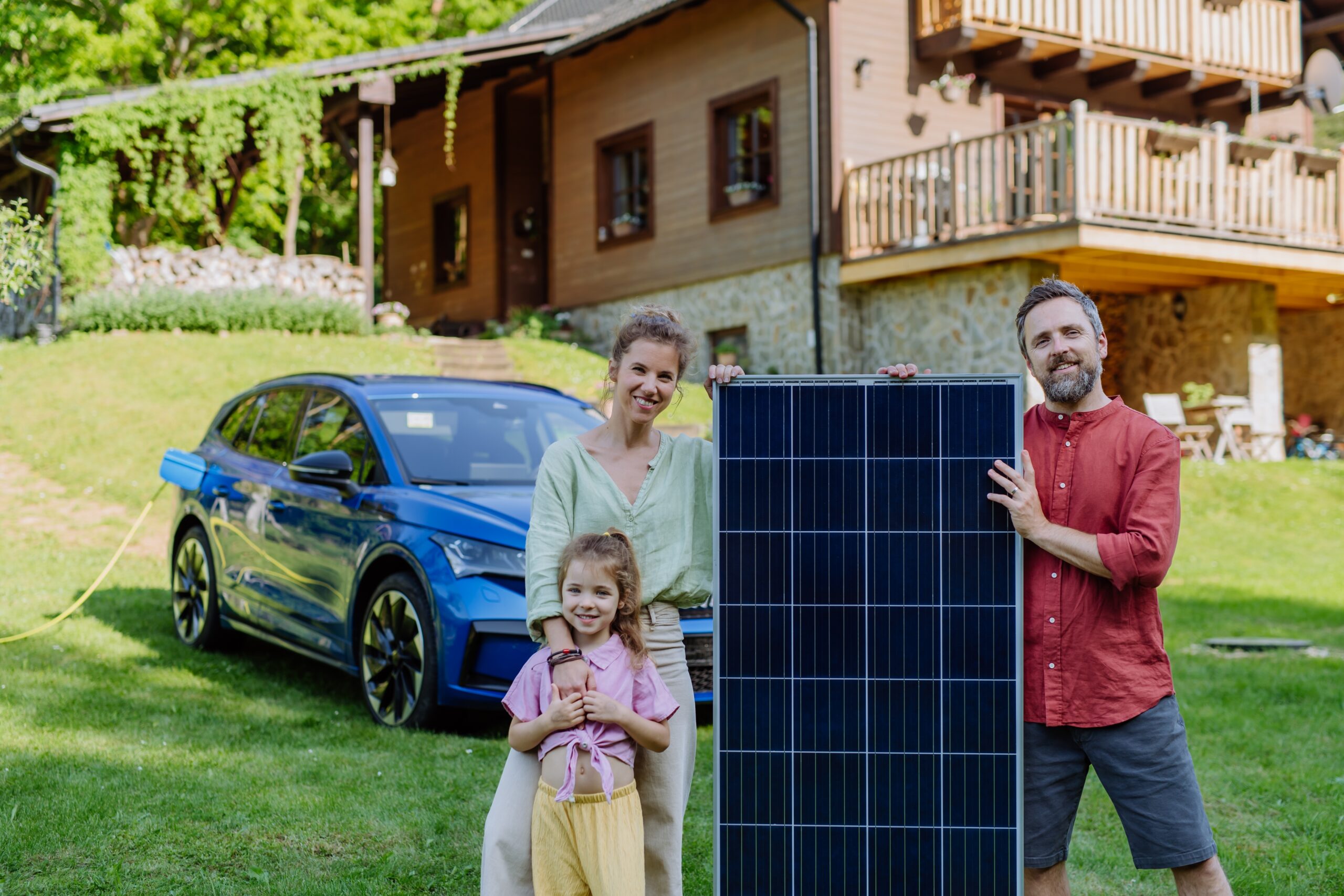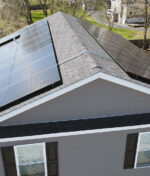
Reliable Power: Solar and Battery Storage for RI & MA Homes
Why Solar and Battery Storage Is Ideal for Blackout Protection
Have you ever wondered how to keep your lights on during a power outage? Solar panels paired with battery storage offer a reliable solution for blackout protection. This article explores the benefits of solar and battery systems during power failures, how they function in outage scenarios, and the financial incentives available. We’ll also discuss installation considerations and how these systems prepare you for future energy resilience. By the end, you’ll understand why solar and battery storage is an ideal choice for safeguarding your home against unexpected blackouts.
Understand the Benefits of Solar and Battery Storage for Blackouts
Solar energy and battery storage systems offer comprehensive protection against blackouts. These systems stabilize power during outages, store energy for emergencies, and provide economic advantages. Homeowners can reduce their carbon footprint and energy consumption while ensuring backup power for critical home functions. Unlike whole home generators, solar and storage solutions offer renewable energy benefits, making them an ideal choice for reliable, sustainable power.
Learn How Solar Energy Stabilizes Power During Outages
Solar energy systems with battery storage stabilize power during outages by seamlessly switching to stored energy when the grid fails. This technology ensures a consistent power supply, allowing homeowners to maintain critical functions even during blackouts. When homeowners install solar panels with backup batteries, they create a reliable, off-grid power source that can operate independently of utility companies. This system not only provides protection against outages but also offers benefits like net metering, potentially reducing overall energy costs.
Discover How Battery Systems Store Energy for Emergencies
Battery systems play a crucial role in storing energy for emergencies during solar battery installations. Unlike a whole house generator that relies on combustion, solar batteries use a power inverter to store excess electricity generated by solar panels. This stored energy can be used during blackouts, ensuring continuous power supply without the need for fuel. While the list price for solar battery systems may be higher initially, they offer long-term cost savings and environmental benefits compared to traditional generators.
Recognize the Economic Advantages of Solar and Storage
Solar and battery storage systems offer significant economic advantages over traditional backup power solutions like whole house generators. These systems promote energy independence, reduce ongoing fuel costs, and comply with the national electrical code. While the initial construction costs may be higher, homeowners can benefit from long-term savings on electricity bills and potential tax incentives, making solar and storage a wise investment for both blackout protection and financial stability.
Explore Environmental Benefits of Renewable Energy Sources
Renewable energy sources, such as solar power with home battery backup systems, offer significant environmental benefits compared to traditional power sources. Solar battery installations reduce reliance on fossil fuels, decreasing greenhouse gas emissions and air pollution. These systems, compliant with electrical codes, provide clean energy while minimizing the carbon footprint of homes. Home energy storage solutions powered by solar panels produce no direct emissions during operation, contributing to a healthier environment and more sustainable future.
Evaluate Backup Energy for Critical Home Functions
Solar panels with battery storage provide reliable backup energy for critical home functions during power outages. Unlike generac home generators, these systems can power essential appliances and lighting without relying on fossil fuels. Homeowners can prioritize crucial devices, ensuring uninterrupted operation during blackouts and peak demand periods. With available incentives, installing a solar and battery system offers long-term protection against grid failures while reducing overall energy costs.
The sun’s power can shield you from darkness. Now, let’s see how solar truly works when the lights go out.
Evaluate How Solar Energy Works During Blackouts
Solar energy systems operate differently during blackouts, requiring specific components and configurations for continuous power supply. This section examines solar energy production principles, inverter functions, panel generation, net metering policies, and energy storage limitations. Understanding these aspects provides valuable information for homeowners considering solar solutions with backup capabilities, ensuring reliable power even when the grid fails.
Unpack the Basic Principles of Solar Energy Production
Solar power systems convert sunlight into electricity through photovoltaic cells, which generate direct current (DC) power. This DC power is then transformed into alternating current (AC) by inverters for home use. During blackouts, solar panels continue to produce electricity, but without proper storage and integration, this energy cannot be utilized. Battery storage systems increase energy density, allowing homeowners to store excess solar power for use during outages. The amount of electricity stored is measured in watt-hours, providing a reliable backup power source when the electric grid fails.
Analyze the Role of Inverters in Blackout Situations
Inverters play a crucial role during blackouts by managing the flow of electricity between solar panels, batteries, and home electronics. Unlike a home standby generator, solar inverters automatically detect grid outages and switch to battery power, ensuring uninterrupted electricity supply for homeowners. While the solar battery cost may be higher initially, it offers long-term savings compared to an electric generator. Modern inverters also prioritize power distribution, directing stored energy to essential appliances during outages.
Understand How Solar Panels Continue to Generate Power
Solar panels continue to generate electricity during blackouts, but without a proper solar battery installation near me, this power cannot be utilized. Unlike a generac whole home generator, solar systems require a transfer switch and energy storage solution, such as a tesla powerwall, to provide backup power during outages. The cost of these components may be higher initially, but they offer long-term savings and environmental benefits compared to traditional generators.
Review Net Metering and Energy Credits During Outages
During power outages, net metering and energy credits operate differently. While solar panels continue generating electricity, the lack of grid connection prevents homeowners from earning credits. However, solar systems with a battery can store excess energy for later use. This stored power can support essential loads like air conditioning during blackouts. Retrofitting existing solar installations with battery storage enables homeowners to maintain energy independence and maximize their solar investment, even when the grid is down.
Identify the Limitations of Solar Power Without Storage
Solar systems without storage face significant limitations during blackouts. While panels continue generating electricity, the lack of a battery prevents its use, rendering the system ineffective when the grid fails. Homeowners relying solely on solar power may find themselves without electricity for essential appliances or mobile phone charging during outages. To overcome this, consulting an electrician about adding battery storage can enhance system resilience within budget constraints, ensuring power availability even when sunlight is limited or the roof-mounted panels are compromised.
The batteries stood silent, waiting. Their true power would soon be revealed.
Investigate the Role of Battery Storage in Blackout Scenarios
Battery storage plays a crucial role in blackout protection for solar-powered homes. This section explores lithium-ion battery functionality, compares various home battery systems, discusses capacity requirements, examines lifespan and maintenance, and outlines solar system integration. Understanding these aspects helps homeowners choose the right battery backup for their needs, ensuring reliable power during outages and maximizing their whole home battery backup investment.
Understand the Functionality of Lithium-Ion Batteries
Lithium-ion batteries serve as the cornerstone of sustainable energy storage systems, efficiently storing electricity generated by solar panels for use during blackouts. These advanced batteries offer high energy density, rapid charging capabilities, and long cycle life, making them ideal for backup power applications. Homeowners can benefit from tax incentives when installing lithium-ion battery systems, further enhancing the economic advantages of this reliable backup solution.
Compare Different Types of Battery Systems for Home Use
Homeowners can choose from various battery systems for blackout protection, each with unique advantages. Lithium-ion batteries offer high efficiency and long lifespan, making them suitable for powering medical devices during outages. Lead-acid batteries provide a cost-effective option but require more maintenance. Flow batteries excel in scalability and duration, ideal for extended power failures. When selecting a system, homeowners should consider factors such as capacity, discharge rate, and compatibility with their existing solar setup. Many battery systems qualify for tax credits, offsetting initial costs while reducing air pollution from traditional backup generators.
Discuss Battery Capacity and Its Importance During Blackouts
Battery capacity plays a crucial role during blackouts, determining how long a home can maintain power without grid access. A lithium iron phosphate battery with sufficient capacity can keep essential appliances like refrigerators running for extended periods, outperforming traditional house generators. Homeowners should consider their energy needs, including manufacturing processes or electric vehicle charging, when selecting a battery system to ensure adequate backup power during outages.
Learn About Battery Lifespan and Maintenance Requirements
Battery lifespan and maintenance requirements are crucial factors in selecting a solar storage system for blackout protection. Most modern lithium-ion batteries, often considered the best whole house generator alternative, can last 10-15 years with minimal maintenance, outperforming traditional electric heating backup systems. Homeowners should review the utility’s terms of service to ensure compliance with grid connection regulations. Regular system checks and software updates help maintain optimal performance, making solar battery storage an environmentally friendly and low-maintenance solution for long-term power reliability.
Examine How Batteries Can Integrate With Solar Systems
Solar systems integrate seamlessly with battery storage, creating a robust solution for blackout protection. When the electrical grid fails, these integrated systems automatically switch to battery power, maintaining efficiency and preserving essential functions. This setup can even participate in virtual power plant networks, contributing to grid stability while reducing reliance on natural gas and other fossil fuels. The synergy between solar panels and battery storage transforms homes into self-sufficient energy machines, capable of weathering power outages with minimal disruption.
Blackouts became less daunting with battery storage. Now, let’s explore how your wallet can benefit from going solar.
Recognize Financial Incentives for Solar and Battery Systems
Financial incentives significantly enhance the appeal of solar and battery storage systems for blackout protection. Homeowners can benefit from tax credits, local grants, and rebates for energy storage solutions like the Tesla Powerwall. Financing options, potential energy cost savings, and long-term return on investment make these systems, including lithium batteries, attractive for emergency power needs such as running continuous positive airway pressure devices during outages. Understanding these incentives helps homeowners make informed decisions about adopting solar and battery technology.
Identify Available Tax Credits for Solar Installations
Homeowners can benefit from significant tax credits when installing solar and battery systems for blackout protection. The federal investment tax credit (ITC) allows eligible homeowners to deduct a percentage of their solar installation costs from their federal taxes. While the exact percentage may vary, this incentive substantially reduces the overall cost of home solar systems. Some states, like Massachusetts and Rhode Island, offer additional tax credits or rebates, further offsetting expenses. These incentives make solar installations more affordable than alternatives like Generac home generators, enabling homeowners to power essential devices such as laptops during outages without relying on fossil fuel-powered engines.
Explore Local Grants and Rebates for Energy Storage
Many local governments and utility companies offer grants and rebates for energy storage systems, making solar battery solutions more affordable. For example, some areas provide incentives for installing SolarEdge inverters or Bluetti EP900 batteries alongside solar panels. These programs can significantly reduce the upfront cost of a solar energy system, making the price more competitive with traditional backup power options. Homeowners should research available incentives in their area to maximize savings on their solar inverter and battery storage installation.
Review Financing Options for Solar Projects
Homeowners exploring solar projects for backup power have various financing options available. Solar loans offer competitive interest rates and flexible payment terms, making them an attractive alternative to purchasing a generac standby generator outright. Some installers provide power purchase agreements (PPAs) or leasing options, allowing homeowners to install solar systems with little to no upfront cost while still benefiting from reduced electricity bills and backup power during outages. These financing solutions often include provisions for battery storage, ensuring a comprehensive backup power system that outperforms traditional generators in terms of long-term cost-effectiveness and voltage stability.
Assess Potential Savings From Reduced Energy Costs
Homeowners can achieve substantial savings through reduced energy costs by adding a battery to a solar system. This combination optimizes energy resource utilization, converting solar-generated direct current into usable alternating current for household electrification. By leveraging stored energy during peak demand periods and outages, homeowners reduce reliance on grid electricity, potentially lowering monthly utility bills and providing long-term financial benefits.
Analyze Long-Term Return on Investment for Battery Solutions
Solar and battery storage systems offer a compelling long-term return on investment for homeowners seeking blackout protection. Unlike propane generators that produce carbon monoxide, solar solutions provide clean, renewable energy without ongoing fuel costs. Homeowners can benefit from rebates and incentives, reducing initial expenses while ensuring reliable power for home appliances during outages. Over time, the savings on electricity bills and potential income from excess energy production can offset the initial investment, making solar and battery systems a financially sound choice for long-term energy security.
Financial incentives make solar and battery systems attractive. Understanding installation considerations ensures you maximize their benefits.
Discover Solar and Battery Storage Installation Considerations
Installing solar and battery storage systems requires careful planning. Site assessment and system sizing ensure optimal performance. Permits and regulations must be navigated. Homeowners can choose between professional installation or DIY options. Understanding timelines and costs helps in budgeting. Selecting reliable providers like EcoFlow for home backup solutions is crucial. These considerations ensure a safe, efficient system that protects against blackouts and potential gas leaks while providing stable electrical energy.
Evaluate Site Assessment and System Sizing Requirements
Proper site assessment and system sizing are crucial for optimal solar and battery storage installation. Safety management plays a key role in determining the ideal placement of solar panels and Tesla battery backup systems. Professionals evaluate factors such as roof condition, shading, and electrical infrastructure to ensure efficient direct current generation. The cost to install solar panels and battery storage varies based on these assessments, as system size directly impacts overall expenses and potential savings.
Learn About Necessary Permits and Regulations for Installation
Solar battery installation requires adherence to local permits and regulations. Homeowners should consult solar battery installers near them to navigate these requirements, ensuring compliance with privacy and data protection laws. Unlike standby generators, solar battery systems often face stricter regulations due to their grid connection. Professional installers can help secure necessary permits, coordinate inspections, and ensure the system meets all local building codes and utility company specifications.
Consider Professional Installation Versus DIY Options
Professional installation of solar and battery storage systems offers several advantages over DIY options. While DIY may seem cost-effective initially, professional installers possess the expertise to optimize system performance, ensuring maximum protection during blackouts. They can accurately assess heating requirements and design a system that efficiently utilizes stored energy. Professional installation also guarantees compliance with safety standards, reducing the risk of issues related to diesel fuel storage. Ultimately, professional installation represents a sound investment, providing peace of mind and potentially higher long-term returns.
Discuss Timelines and Costs Associated With Installation
Solar and battery storage installation timelines typically range from 1-3 months, depending on system complexity and local permitting processes. Costs vary based on system size, battery capacity, and equipment quality, but generally fall between $15,000 to $30,000 for a comprehensive setup. Homeowners should factor in potential savings from tax incentives and reduced energy bills when considering the overall investment. Proper planning and working with experienced installers can help streamline the process and ensure optimal system performance for long-term blackout protection.
Identify Reliable Solar and Storage Solution Providers
Selecting reliable solar and storage solution providers is crucial for effective blackout protection. Homeowners should research companies with proven track records, positive customer reviews, and extensive experience in solar panel and battery storage installations. Reputable providers offer comprehensive services, including system design, permitting assistance, and ongoing maintenance support, ensuring optimal performance and longevity of the solar and battery storage system.
Solar and battery systems offer more than just power. They provide peace of mind and a shield against future uncertainties.
Prepare for Future Energy Resilience With Solar Solutions
Preparing for future energy resilience with solar solutions involves staying ahead of technological advancements, exploring community storage options, and planning for scalable systems. Homeowners can benefit from monitoring solar technology improvements, assessing collective resilience strategies, and anticipating future energy demands. Staying informed on evolving policies and advocating for renewable initiatives ensures long-term energy security and blackout protection.
Monitor Advancements in Solar Technology for Improved Performance
Homeowners can enhance their blackout protection by staying informed about advancements in solar technology. As solar panel efficiency and battery storage capacity improve, systems become more effective at providing reliable power during outages. Monitoring these developments allows homeowners to upgrade their systems strategically, ensuring optimal performance and long-term energy resilience.
Assess Community Storage Options for Collective Resilience
Community storage options offer collective resilience against blackouts by pooling resources and sharing stored solar energy. Homeowners can participate in neighborhood microgrids or virtual power plants, enhancing overall energy security. These collaborative approaches not only provide more robust backup power during outages but also contribute to grid stability and potentially reduce individual system costs.
Plan for Future Energy Demands With Scalable Systems
Homeowners can future-proof their energy systems by investing in scalable solar and battery storage solutions. These systems allow for easy expansion to meet growing energy demands, such as adding electric vehicles or increasing household appliances. By choosing modular components, homeowners can incrementally upgrade their setups, ensuring long-term blackout protection and energy independence without the need for complete system overhauls.
Stay Informed on Evolving Energy Policies and Regulations
Homeowners benefit from staying informed about evolving energy policies and regulations to maximize their solar and battery storage investments. Changes in net metering policies, interconnection standards, and energy storage incentives can significantly impact system economics and functionality. By keeping abreast of these developments, homeowners can adapt their systems to comply with new requirements and take advantage of emerging opportunities for grid services or energy trading, enhancing their blackout protection and overall energy resilience.
Advocate for Renewable Energy Initiatives in Your Area
Homeowners can advocate for renewable energy initiatives in their area to strengthen energy resilience and improve blackout protection. By supporting local policies that promote solar adoption and energy storage, residents can help create a more robust and sustainable power grid. Engaging with local officials, joining community energy groups, and participating in public forums on renewable energy can drive positive change and enhance the overall energy security of the community.
Conclusion
Solar and battery storage systems offer unparalleled blackout protection, providing homeowners with reliable power during outages while reducing reliance on fossil fuels. These systems not only ensure energy independence but also offer long-term cost savings through reduced electricity bills and potential tax incentives. By integrating advanced technologies and scalable solutions, solar and battery storage installations future-proof homes against evolving energy demands and grid instabilities. Embracing this sustainable approach to backup power not only safeguards individual households but also contributes to community resilience and a cleaner environment.




